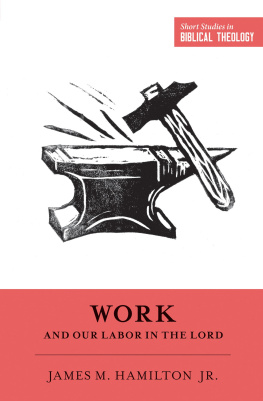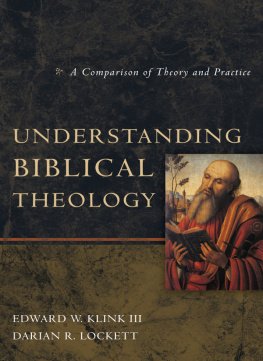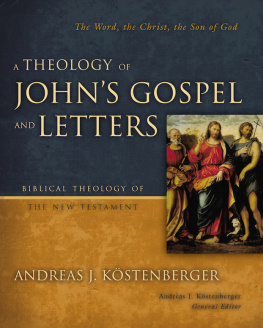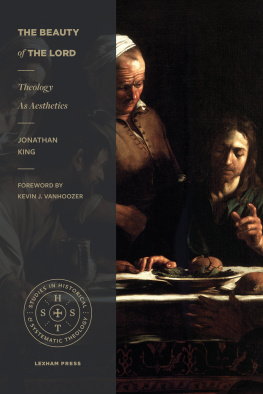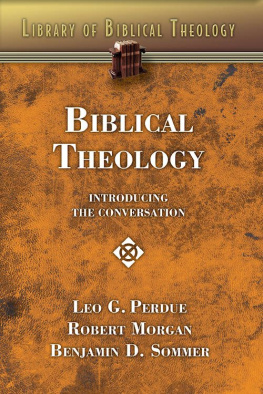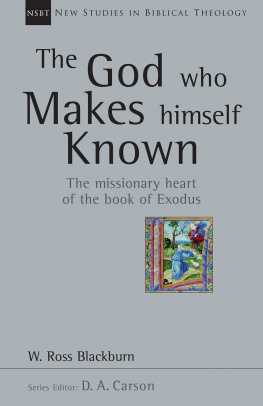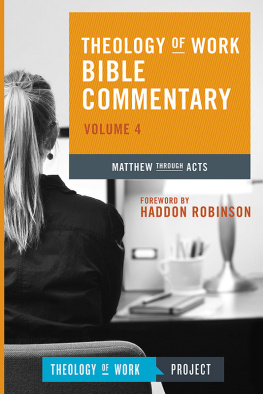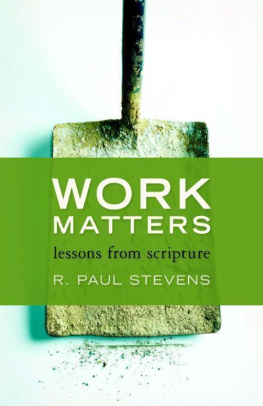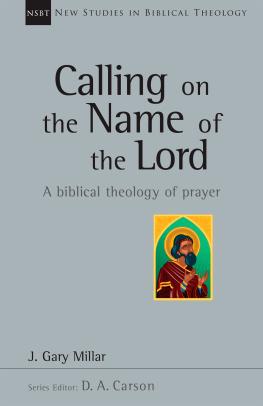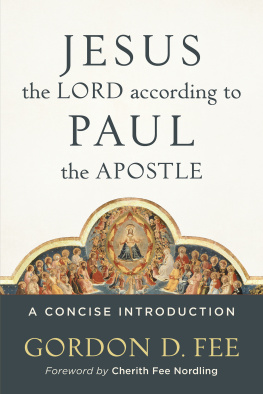Table of Contents
Landmarks
Short Studies in Biblical Theology
Edited by Dane C. Ortlund and Miles V. Van Pelt
The City of God and the Goal of Creation , T. Desmond Alexander (2018)
Covenant and God's Purpose for the World , Thomas R. Schreiner (2017)
From Chaos to Cosmos: Creation to New Creation , Sidney Greidanus (2018)
The Kingdom of God and the Glory of the Cross , Patrick Schreiner (2018)
The Lords Supper as the Sign and Meal of the New Covenant , Guy Prentiss Waters (2019)
Marriage and the Mystery of the Gospel , Ray Ortlund (2016)
The Son of God and the New Creation , Graeme Goldsworthy (2015)
Work and Our Labor in the Lord , James M. Hamilton Jr. (2017)
Redemptive Reversals and the Ironic Overturning of Human Wisdom , G. K. Beale (2019)
Work in the Very Good Garden
The stories we tell reveal our understanding of the world, with our hopes and fears, and the songs we sing are poetic crystallizations of the deep longings of our hearts. The deep longings of our hearts correspond to what we envision as the good life. Our vision of the good life can be understood as our vision of
Gods Design for Work
The soundtrack to the movie O Brother, Where Art Thou ? includes the song Big Rock Candy Mountain. The lyrics celebrate handouts that grow on bushes, trees that sprout cigarettes, and bulldogs that have rubber teeth so their watchdog bites are harmless. This songs idyllic landscape includes streams of alcohol beside a lake of stew, and whiskey too, because those who sing it want to escape reality by means of intoxication and to be fed though they have not worked. They want mountains made of rock candy. They want no tools such as shovels, axes, saws, or picks. They want to sleep all day, and they want to hang the jerk that invented work. I wonder if the songwriter realized that would put the noose around Gods neck!
The songs sentiments fall significantly short of the glory that God intended when he created man in his own image and gave him work to do. Life at the Big Rock Candy Mountain would not result in true and lasting happiness or satisfaction. The Bible says there is a primal mountain that is our destination, but its not one that will rot teeth and indulge character deficiencies. Contrast Big Rock Candy Mountain with Psalm 128:
A Song of Ascents.
Blessed is everyone who fears the L ord ,
who walks in his ways!
You shall eat the fruit of the labor of your hands;
you shall be blessed, and it shall be well with you.
Your wife will be like a fruitful vine
within your house;
your children will be like olive shoots
around your table.
Behold, thus shall the man be blessed
who fears the L ord .
The L ord bless you from Zion!
May you see the prosperity of Jerusalem all the days of your life!
May you see your childrens children!
Peace be upon Israel!
This song is addressed to a man who works, and the blessing comes to him because he fears Yahweh and walks in Yahwehs ways. The blessing of Yahweh takes the form of this man enjoying the results of his work, which he has done to provide for his wife and children. Psalm 128s depiction of the good life, then, entails hard work done to provide for others, dependents, whose growth and fruitfulness are evidence of Gods favor and blessing. Prosperity here includes godliness, responsibility, stewardship, and awareness of God, prompting fear and obedience and virtue.
28).
Big Rock Candy Mountain and Psalm 128 sing different versions of the good life. In the Bible, the land of promise is not the place sought by freeloaders and slackers who long for an El Dorado where theft is easy, the hills are made of sugar, work is abolished, and handouts are freely distributed to tramps and bums who have neither responsibilities nor families.
The Bibles songs are rooted in hopes seeded by its wider story, watered by Gods promises. What is the role of work in that story? We begin our answer to that question by looking at what God created the good life to look like, when the world was without sin. We will start with work in the garden in Genesis 12. From there we will seek insight on what life in Eden could have been like from the blessings of the covenant in Deuteronomy 28:114. We will then consider how the judgment on God - given tasks in Genesis 3:1619 subjects work to futility (cf. Rom. 8:20).
Work in the Garden (Genesis 12)
The Bibles story of the world opens with God doing work, six days of it. Once completed, not from weariness but because the work was done, God rested on the seventh day (Gen. 1:12:3; Heb. 4:34). Given that man is made in Gods image and likeness (Gen. 1:27), with Christians called to be imitators of God (Eph. 5:1), the fact that the Bible opens with this scene of God doing the work of creation by his powerful word calls for reflection. God works by speaking words. Among other things, this validates all kinds of knowledge work in which the hard work of thinking and communicating accomplishes what those made in Gods image have set out to do. But what words are like Gods words? What words could make worlds?
In addition to being able to marshal his army of words to accomplish his purposes, then, we see from this vast and splendid universe that God is a skilled worker who completes his tasks with unparalleled excellence and creativity. Work is neither punishment nor cursed drudgery but an exalted, Godlike activity. Nor should we think that once God completed the work of creation he was finished with workas though he made the watch then simply left it to tick away the seconds. As a justification for his right to heal on the Sabbath, Jesus declared, My Father is working until now, and I am working (John 5:17). The Bible opens with a depiction of God at work, and the operational understanding throughout the Bible is that God continues to work, guiding, upholding, loving, judging, and saving.
The first thing the Bible shows us about God is that he is a creative, competent, efficient, caring worker, whose work provides for others, blesses others, meets the needs of others, and makes life possible for them.
The creation of man and woman is accompanied by a blessing and a task, a charge and commission, which spring from Gods intention for man as he made them, male and female. Genesis 1:26 presents God intending to grant dominion , royal rule, over the animal kingdom from the moment he decides to make man in his own image and likenessindeed, dominion because made in Gods image and likeness. God made male and female in his own image (Gen. 1:27); then he blessed them and told them what he wanted them to do (1:28).
Man was created not for passive observation of the world but for an epic task, a worldwide venture. Genesis 1:28 recounts,
And God blessed them. And God said to them, Be fruitful and multiply and fill the earth and subdue it, and have dominion over the fish of the sea and over the birds of the heavens and over every living thing that moves on the earth.
God commands the man and woman in Genesis 1:28 to be fruitful and multiply and thereby fill the earththe whole thing. Then they are to subdue itthe whole thing. God next charges them to exercise dominion over the animal kingdomthe whole thing. The tasks in Genesis 1:28 are interrelated and interdependent. Man is to be fruitful and multiply so as to fill, subdue, and rule. It is interesting to observe that in order to subdue and rule, man will have to be fruitful, multiply, and fill. This makes the fact that man was made male and female (
The marriage of the man and the woman (Gen. 2:1825) will make possible the fruitful multiplication, which will enable the filling, subduing, and ruling. This tells us that the work God gave the man to do is not to be disconnected from marriage and family. In fact, marriage and family enable the man to accomplish the work God told him to do. These foundational realities in Genesis naturally give rise to songs such as Psalm 128, where the blessed man enjoys the fruits of his labor in the context of his family.

